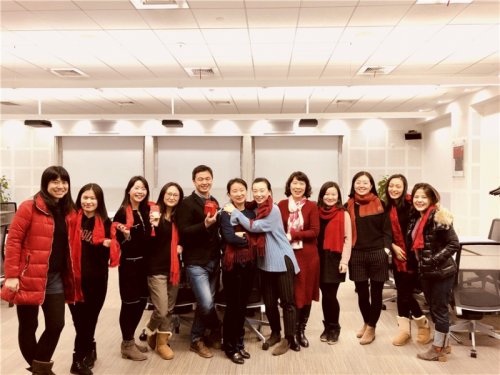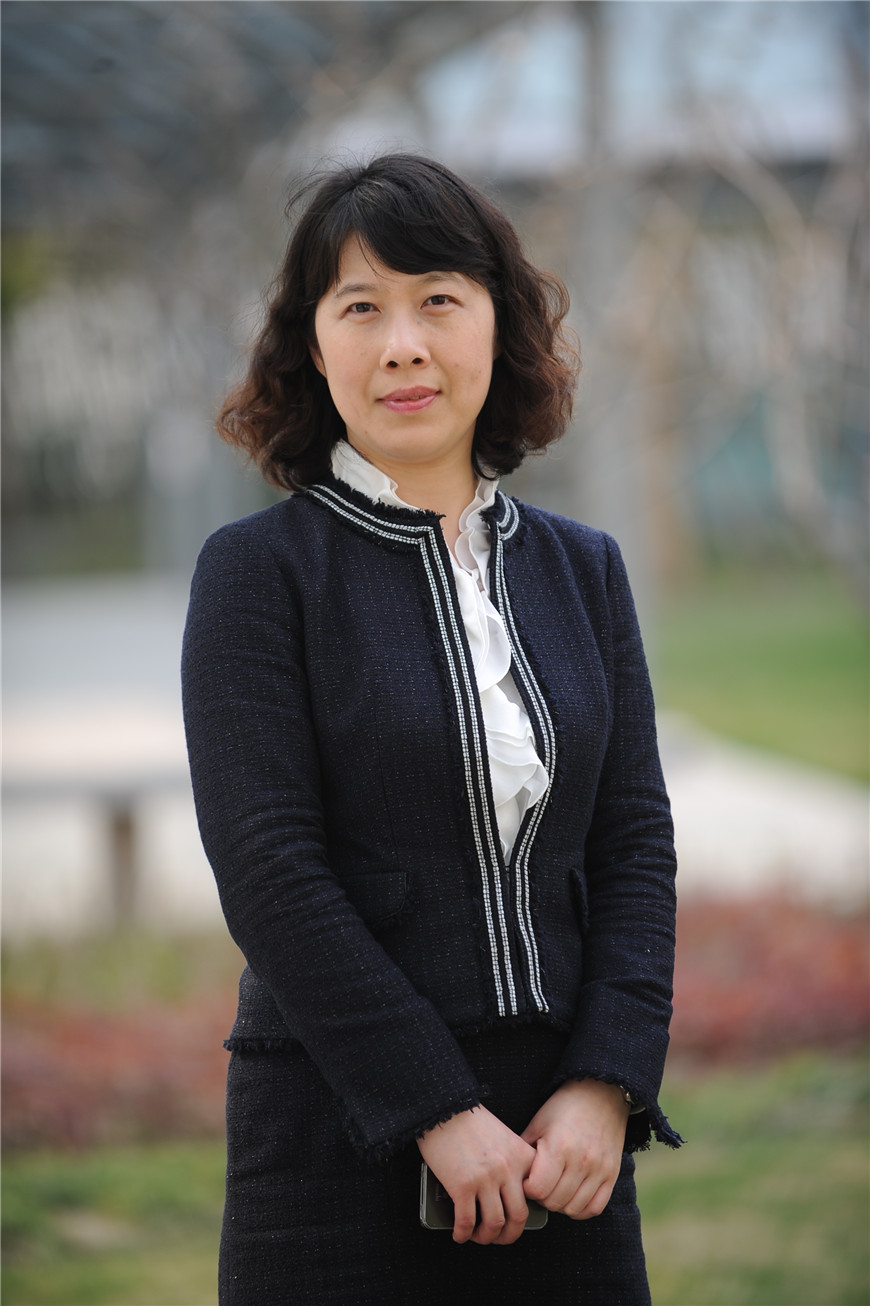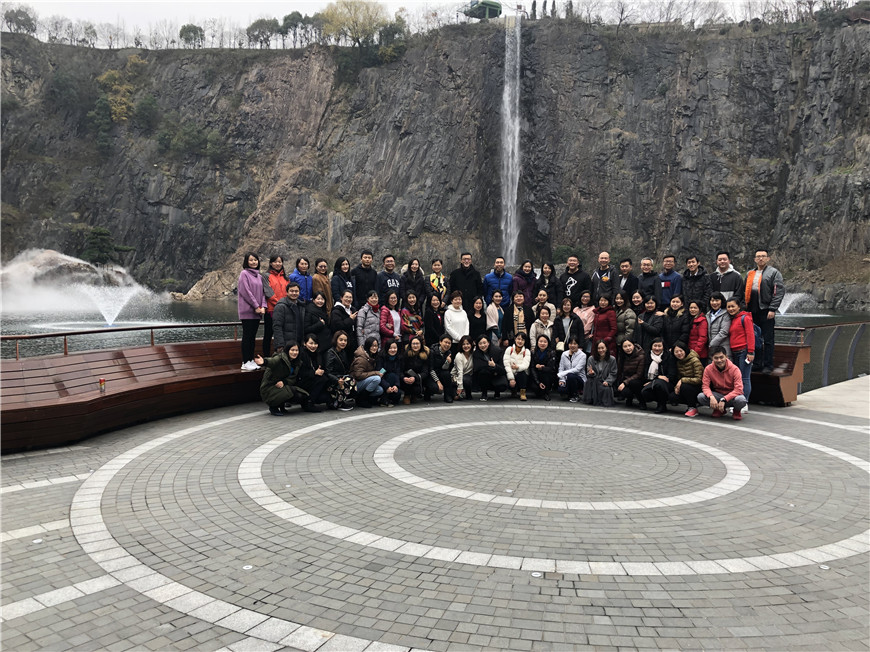Aileen Zhang: Driven by a Sense of Honour

By Lei Na
On a warm afternoon in winter, I arrive at the Executive Education (EE) Department in the Academic Centre IV building on CEIBS Shanghai Campus for a conversation with senior programme manager Aileen Zhang. It’s a sunny space, with modern facilities. On sleek display shelves, photos of students in class are on the covers of almost all the brochures that provide information about the various programmes. A small forum is underway in a modern classroom on the first floor, the speaker is a big name within his industry. When students emerge from the classroom, they step into an open, elegant space where they can have a tea-break infused with frank exchanges and thoughtful discussions.
The entire building has an atmosphere of assertiveness, and it strikes me that this is very much aligned with Aileen’s personality. She has been with CEIBS for 16 years. But I can still see a light in her eyes when she says “I really like this job!” Aileen finds a lot of satisfaction in the little details that go into making a programme successful. “My work’s repetitive, but I gain a lot of energy from professors’ lectures and interactions with students,” she explains. “I’ve been learning new things for more than a decade.” Perhaps this is what makes working at CEIBS so special, the many opportunities for personal growth. The changes subtly accumulate over the years, and employees like Aileen acquire new knowledge as they learn alongside others and become better versions of themselves.
There is a blending of softness and strength in her Chinese name, Zhang Jianying, and this blend can also be seen in how she approaches her job, it shapes her work style. As we speak, she stresses the need for critical thinking and the role it plays in the school’s growth and development. When EE team members offer advice to other departments and colleagues across the school, Aileen stresses, there is no other motivation than the need to enhance CEIBS’ brand and reputation. “A lack of critical thinking by staff is bad for the development of an organization,” she explains. “Of course, having a culture of cooperation is good, but providing advice on how we can make improvements is also good for the big picture.”
I summarize our conversation into eight key words as I take you on a journey into Aileen’s life at CEIBS.
“Dai Ke”
 “‘Dai Ke (programme operation)’ is the phrase we use the most as class coordinators. After enrolment, we take over the job by contacting students, telling them about the curriculum, room and board arrangements, providing reading materials, and planning schedules. After the programme begins, we have to ensure there is a smooth daily rhythm, providing organizational and logistical support. After the programme ends, we need to prepare reports and assessments for follow-up communication with students. For each programme in progress, class coordinators have been involved with its implementation in the early, middle and late stages. This is what we call ‘Dai Ke’.”
“‘Dai Ke (programme operation)’ is the phrase we use the most as class coordinators. After enrolment, we take over the job by contacting students, telling them about the curriculum, room and board arrangements, providing reading materials, and planning schedules. After the programme begins, we have to ensure there is a smooth daily rhythm, providing organizational and logistical support. After the programme ends, we need to prepare reports and assessments for follow-up communication with students. For each programme in progress, class coordinators have been involved with its implementation in the early, middle and late stages. This is what we call ‘Dai Ke’.”
Students
“I’ve been here at CEIBS for 16 years. During these years, I’ve witnessed great changes in the students. From changes in student groups, I can see the main drivers of China’s economic development in different stages.
I joined CEIBS in 2003, when the students were mainly employees in foreign companies. For management training, a western way of learning, there was a lack of acceptance among SOEs. The number of students from private companies increased between 2008 and 2009. Now, the student mix is diverse, with students from all walks of life. You can see the growing power of private companies. Many SOEs are also making a regular effort at management training.
As for students, their knowledge structure has become more elaborate. Many of them have unique insights and demanding requirements as they have been educated overseas or have had access to management knowledge through various channels. Previously, students thought teachers were always right. Now they challenge teachers and put forward their own opinions. For us, this job is becoming more and more challenging.”
Communication
“There are two types of EE programmes: company specific programmes (CSP) and open enrolment programmes (OEP).
When it comes to CSP, the programme design team will do a lot of research on a company after the initial discussion with the firm, design a programme based on the company’s needs, and get the company’s approval. During the programme, the goal is to ensure that students’ requirements are met.
When it comes to OEP, we provide a variety of well-designed programmes from which students from a range of companies and industries can choose. During the programme, we get their feedback, and we get a clear picture of the actual tasks they do on the job and the tools/skills or academic knowledge they need from us. After the programme is completed, we also ask students — during the programme evaluation stage — to include their suggestions on how we can improve.”
Dual role
“One of the things that makes EE class coordinators special is that they play the dual role of class coordinator and teaching assistant; and they have to constantly switch between these two roles. So we need to consider two things when hiring a class coordinator. We pay attention to the person’s project management ability, work efficiency, ability to think logically and risk control capability. We also want the person to have some soft skills, such as patience, effective communication and passion for their work, among others.
These two personalities may be contradictory. A person with strict self-control may be introverted. But we want him/her to step forward and interact with other people. It’s impossible to find a person who is perfect in both respects. But the person should be able to develop him/herself in both areas.”
Effort
“I tell new class coordinators: you won’t make the effort unless you like this job; you won’t get the work details right unless you hold to the belief of creating value for students. A class coordinator’s work takes time and energy, and cannot be done easily. We work overtime and on weekends, and have an irregular work and rest routine when programmes are running. But I also tell new employees that their effort will pay off as they will become better at doing complex tasks.”
Ownership
“I’d describe the work atmosphere at EE as intense and efficient teamwork. Everyone is a small entrepreneur taking his projects very seriously, with a sense of ownership. This is not only the case for the class coordinator team, but for the sales and programme teams as well. How I meet a student’s learning needs after his/her enrolment has little to do with my position and salary, but rather with my sense of honour. I care about this very much. Motivated by this atmosphere, no one in the office will slack off.”
Accomplishment & Pride
“Work brings you a sense of accomplishment and pride. You’ll have this feeling when you hear students say CEIBS’ programmes are different from others, CEIBS is good at programme management, and learning at CEIBS is a great help for them. Most people in our team think as I do — making a contribution is what motivates us. You may not always hear our names on campus. But professors, as well as students, have given their thanks to us in private. It is this sense of accomplishment and pride that drives our enthusiasm for work.”















